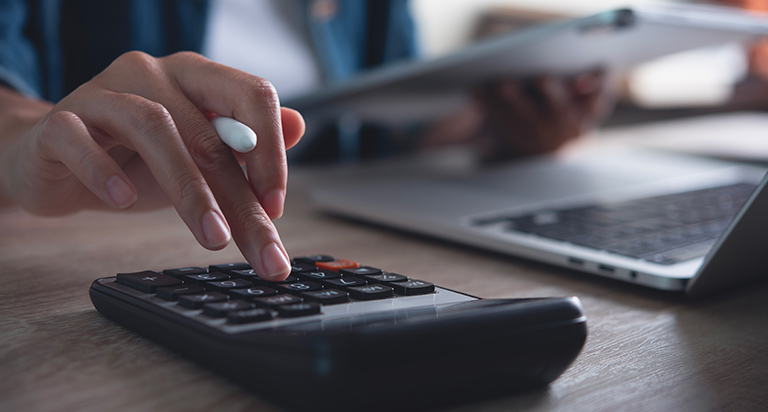How to Develop Better Money Habits During a Recession


Highlights:
- Recessions happen when a region's economy declines over time, often resulting in slower production across various industries, reduced corporate profits and a rise in unemployment.
- During a recession, it's important to create a detailed budget and spend less money than you make each month.
- Do your best to add to your savings and keep paying down your debt, even during a recession. Be sure to make at least your minimum required debt payments to avoid expensive fees.
Recessions are a natural part of any economic cycle, but they can still result in serious financial hardship. Luckily, even during a recession, smart money habits can help you protect your finances and weather the storm.
What is a recession?
Recessions happen when a region's economy declines over time. During these periods, gross domestic product (GDP), or the value of a region's goods and services, declines. At the same time, the cost of necessities like groceries or fuel may increase.
With consumers unable to buy goods and services at the rate they normally do, production can slow across various industries. Lower production means reduced business investment and less corporate expansion. As a result, companies may look to cut costs by laying off employees. With a sudden uptick in unemployment, banks and other financial institutions may avoid offering new credit.
During a recession, many households may face income loss, difficulty securing credit and trouble meeting basic expenses. By adopting these smart money habits, you can better prepare yourself to handle an economic downturn.
1. Track your personal finances carefully
Budgeting is one of the best ways to manage your personal finances, especially if you need to understand what you're spending and look for opportunities to cut back.
To assemble a budget, start by determining your monthly household income. This includes your salary, a spouse's or partner's salary, child support or alimony, payments from your retirement or other financial accounts, and any other regular sources of income. If your income varies significantly from month to month, it's generally a good idea to base your budget on the lower end of what you usually earn.
Next, assemble a complete record of your monthly expenses. Budgets will vary from person to person depending on your unique saving, spending and other financial habits. However, you will generally want to account for:
- Housing
- Utilities
- Transportation
- Healthcare
- Food and household goods
- Debt payments
- Education and childcare
- Discretionary spending (things like entertainment, eating out and hobbies)
When you know how much you're spending each month, it's much easier to determine where and how much you can cut back to free up needed funds. Try to target your discretionary expenses, including retail purchases, entertainment, dining/takeout and leisure travel.
2. Spend less money than you earn
You can also use your budget to avoid overspending. This advice may sound simple, but spending less than you earn each month is the only way to cover your expenses while still being able to contribute to your savings.
Break your monthly expenses into two categories: essential (basic living expenses that you can't avoid) and discretionary (expenses that you can cut back).
One way to ensure you spend less than you earn is to use the 50/30/20 rule. With this budgeting approach, you allocate 50% of your spending to essential costs, 30% to discretionary costs and 20% to savings.
3. Maintain an emergency fund
Even during an economic slump, you need to prioritize your savings — in particular, your emergency fund. An emergency fund is designated for unexpected expenses so that you can pay for things like a major car repair or a sudden medical issue, without taking on new debt. This is especially important if you're worried about a layoff or other income loss.
The exact amount you need for an emergency fund depends on your income and your tolerance for risk. However, it's generally recommended to set aside the equivalent of three to six months' worth of expenses. Keep this money in its own account, separate from your checking and long-term savings accounts. Doing so can help discourage premature withdrawals.
To maximize your interest earnings, look for a high-yield savings account, which will have a higher interest rate than other options.
4. Continue to pay down debt
While you'll want to avoid assuming new debt, it's also critical to continue paying off what you already owe. If you're juggling debt on top of your regular monthly expenses, it's important to keep up with at least the minimum payments on everything you owe. Failing to do so can result in late fees, long-term damage to your credit scores and other financial setbacks.
Once you've met your minimums, it's a good idea to focus on repaying your most expensive high-interest debts.
Additionally, during periods of high unemployment, lenders are typically more selective about who they offer funding, so paying down the balances on your existing revolving accounts (such as credit cards and personal lines of credit) may be a better option than applying for new credit.
5. Reevaluate your financial goals
When faced with a recession, it's wise to adjust your short-term financial plan and reassess your future goals.
Try to delay large purchases and avoid new sources of debt. Instead, shift your focus to saving money or achieving debt repayment milestones. Consider growing your emergency fund, making larger contributions to your retirement account or paying down your existing debts. You can always revisit more ambitious financial goals or expensive purchases when the economy is more stable.
It's important to develop a long-term plan that can withstand economic ebbs and flows. Recessions are temporary and the economy will eventually bounce back. With some careful planning, so can your finances.
Get your free credit score today!
We get it, credit scores are important. A monthly free credit score & Equifax credit report are available with Equifax Core CreditTM. No credit card required.



